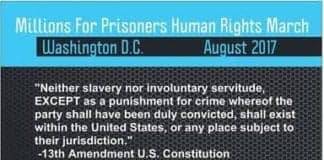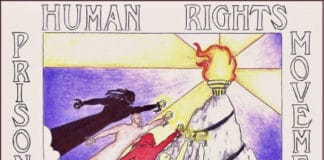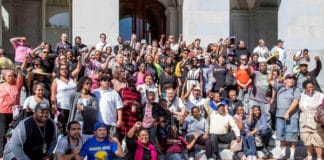Tags J. Heshima Denham
Tag: J. Heshima Denham
Amend The 13th: Why the Millions for Prisoners March is vital...
Working towards the success of the Millions for Prisoners March has been a central theme of the Amend the 13th’s agenda since the outset. In a movement dedicated to not only abolishing legal slavery in Amerika, but transforming the nature and structure of unequal social, political and economic relationships upon which mass incarceration is based, support for the March is of course an obvious priority – but what is not so obvious is why this march is vital to the very future of progressive social change in Amerika.
Prisoner Human Rights Movement Blue Print
CDCr has systemic and dysfunctional problems that run rampant statewide within California’s prisons for both women and men which demand this California government to take immediate action and institute measures to effect genuine tangible changes throughout CDCr on all levels. The Prisoner Human Rights Movement Blue Print is essentially designed to deal with identifying and resolving primary contradictions by focusing on the various problems of CDCr’s dysfunction.
Kern Valley administrators aim to undermine our Agreement to End race-based...
A bulletin from the Prisoner Human Rights Movement (PHRM) and Free Speech Society by Kijana Tashiri Askari, Abdul Olugbala Shakur and J. Heshima Denham - Kern Valley State Prison administrators have instituted COINTELPRO tactics to try and sabotage the historical significance of our Agreement to End Hostilities (AEH). The sabotage entails ...
Quest for Democracy 2015: Formerly incarcerated people lobby for justice in...
Our Formerly Incarcerated Quest for Democracy (Q4D) Day continues to grow and evolve. This year we had over 250 committed people. We had around 30 teams advocating on legislation relevant to formerly incarcerated people and our communities. Grassroots co-sponsors got a chance to educate community members about their bills. And Sen. Holly Mitchell as well as Assemblymembers Reginald Jones-Sawyer and Autumn Burke addressed participants.
Free Speech Society: Forum for prison activists inside and out
The Free Speech Society (FSS) is primarily a movement to defend and preserve the rights of imprisoned activists to inform society of the social contradictions of the prison industrial slave complex in hopes of educating the people not only to the existence of these social ills but their impact on their daily lives. Join us in this historic effort and support the FSS with your time, talent and treasure.
Prisoners’ Agreement to End Hostilities as the basis for the abolition...
On Oct. 10, 2012, the Pelican Bay D-Short Corridor Collective, men from various cultural groups and walks of life, put into effect the historic “Agreement to End Hostilities,” perhaps the single most significant “door to genuine freedom” opened in American society in recent human history. What makes it so significant is not simply its motive force but, more importantly, its true potential for our collective liberation as a society.
Power concedes nothing, Part 2: a discussion on retaliation, censorship and...
Often when citizens of this nation think of “state repression,” images of Egypt, North Korea, Apartheid Palestine or Nazi Germany immediately spring to mind. U.S. state controlled media has become practiced at flooding our airwaves and attitudes with images of violent retaliation and systematic repression of dissent in other nations as a means to obfuscate the U.S. state’s engagement in identical activity in its own society.
Open letter to Assemblyman Tom Ammiano from prisoners in solitary confinement...
We write out of concern for the manner in which certain aspects of CDCR’s Step-Down Program (SDP) are being implemented, specifically, self-directed journals and cognitive behavior therapy. Because the aim of these components is to change and restructure the subject’s thought processes, it is a mental health issue, which requires the involvement of mental health professionals in its implementation and oversight.
Open letter to Sen. Loni Hancock from prisoners in solitary confinement...
We write out of concern for the manner in which certain aspects of the step-down program (SDP) are being implemented by the CDCR, specifically, self-directed journals and cognitive behavior therapy. Because these components have to do with changing and restructuring the thought processes of people, they involve mental health issues and require the involvement of mental health professionals in their implementation and oversight.
Chokwe Lumumba: Dare to struggle, dare to win!
On March 8, hundreds of people, especially from the South and particularly Jackson, Miss., came to mourn and reflect on the life of Mayor Chokwe Lumumba, who died suddenly on Feb. 25 at the age of 66. Starting with a March 5 tribute at the historically Black college, Jackson State University, Mayor Lumumba’s life was memorialized for several days, ending with the masses lining the streets for his burial motorcade. A collection of tributes to the late great mayor of Jackson, Miss.
Power concedes nothing: A discussion on CDCr’s insidious regulatory semantics and...
Our struggle to abolish SHU torture units is inextricably linked to the broader struggle to seize cultural hegemony in the U.S. from the ruling class and its tool, the state. Our collective efforts have repeatedly exposed the state’s contradictions and sparked the people’s appetite for freedom and new social relationships. These activities undermine the reactionary character structure upon which authoritarian society is based. These actions are thus revolutionary.
Declining a deal with the devil: Coercive journaling required to ‘step...
Since implicit in making it a requirement that people participate in those programs available in each step and that any failure to do so will result in a person being moved back to Step 1 until that person agrees to subordinate him/herself to the dictates of Section 700.2 (self-directed journals), the cognitive restructuring/brainwashing program is, clearly, mandatory.
Legislative alert: CDCR’s Step-Down Pilot Program is in fact systematic, mandatory...
There is a matter of some urgency that should be passed along as broadly as possible, because it is just that serious. We issued a statement, “Creating broken men, Part 2,” where we voiced our outrage at the inclusion of the mandatory brainwashing components of Section 700.2 of the CDCR’s Step Down Program (SDP.) Since that time several things have developed.
Agreement to End Hostilities benefits both the streets and the prisons
On Aug. 12, 2012, the Pelican Bay D-Short Corridor Collective issued the historic Agreement to End Hostilities (AEH) in all prison and juvenile facilities and called for its extension to our communities. The strategic and material benefits for our ongoing human rights struggle, thousands of prisoners and their families, is obvious. Less obvious is the unprecedented opportunity for social progress and community development represented by this AEH.
Hunger strike rally at Corcoran Prison: The sound before the fury
It is hot enough in Corcoran, California, to melt people. That being said, it still wasn’t hot enough to keep upwards of 400 people from braving 103-degree weather to mobilize and rally at Corcoran State Prison in support of over 30,000 prisoners on hunger strike in California. The immediate goal is to stop the cruelty and torture that being held in isolation represents. The long-range objective is liberation.
California prisoners launch new hunger strike to protest solitary confinement
Hundreds of people held in California prisons are expected to launch their third large-scale hunger strike in two years today. The current strike, announced by leaders at Pelican Bay State Prison on Feb. 14, is seen as a resumption of the large-scale strikes in June and September 2011, when thousands of prisoners across the state stopped eating for days or weeks in order to press for the five demands laid out by the strike organizers.
Cellmate or not, indeterminate SHU confinement is torture
It has recently been suggested that those confined to these sensory deprivation torture units indefinitely, but who have a cellie, are not in “solitary confinement,” as though another human occupying a space not even large enough for one will somehow mitigate the deleterious effects of this isolation. It doesn’t. The only marked difference is the number of stressors you must contend with in a day.
Corcoran SHU staff told to ignore legal mandate to protect lives...
In preparation for the July 8 peaceful protest action (hunger strike, work stoppage etc.), Corcoran SHU administrators are directing staff to dispense with California law and state procedures and policy regarding mass hunger strikes and instead institute a policy designed to raise the potential for maximum casualties (deaths) amongst prisoner participants.
Stop pre-emptive retaliation against hunger strikers!
Read J. Heshima Denham’s description of what happened to him and others in their SHU March 12, 2013. He believes this is pre-emptive retaliation for their plans to participate in the upcoming hunger strike to begin July 8. Please take a few minutes and either call the Warden’s Office or send an email to let them know we are watching and ready to back the prisoners up in their struggle.
Creating broken men, Part 2
There should be no doubt indefinite solitary confinement is torture. Yet in §700.2, the CDCR has devised an insidious program whereby they can leverage this torture to coerce validated SHU prisoners to submit to brainwashing in lieu of debriefing – the end result being qualitatively no different: “broken men” will be created by a new process.












